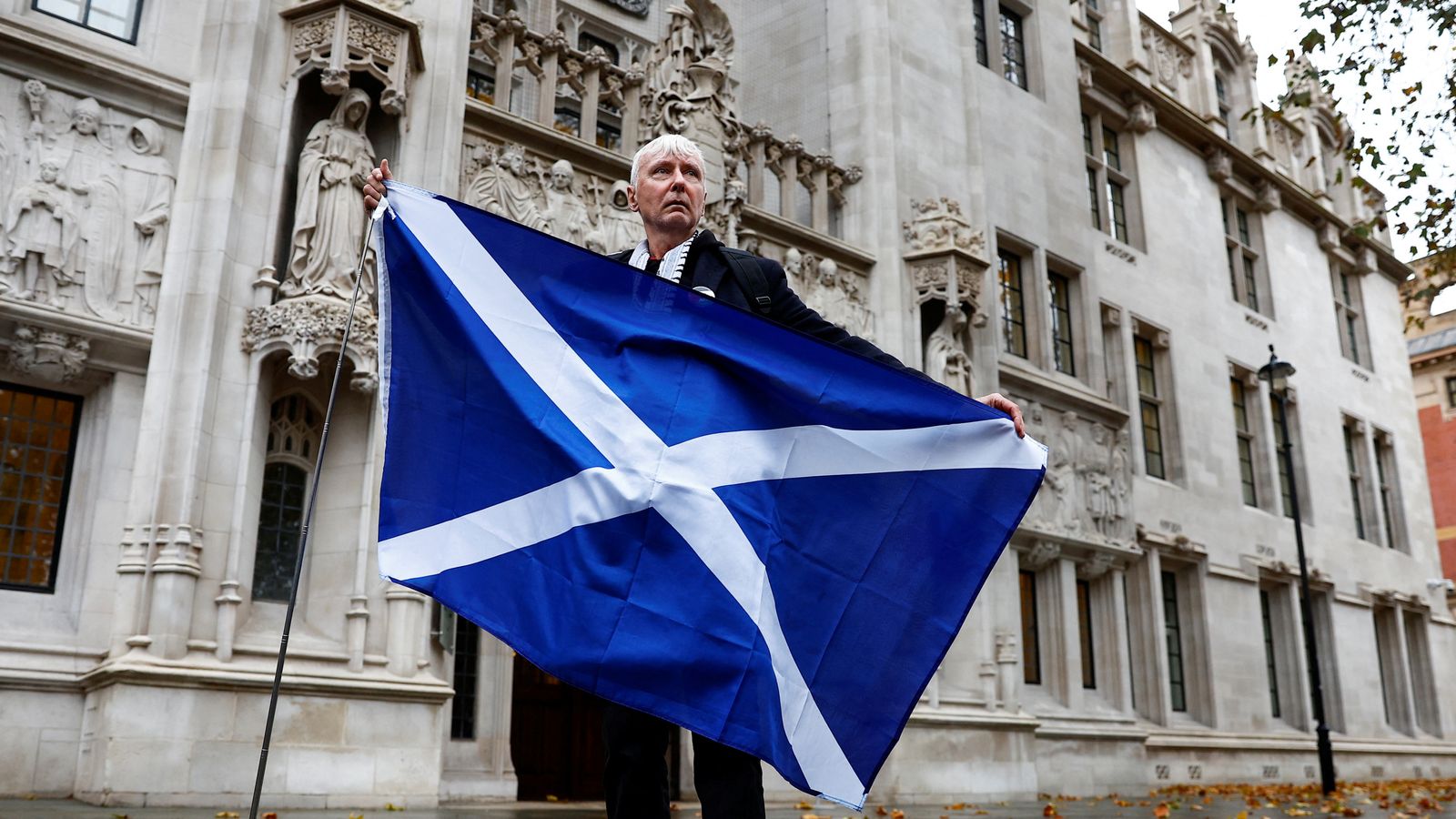Indyref2 cannot go ahead without UK parliament permission, court rules

The Scottish Parliament does not have the power to call a second independence referendum in the country, the Supreme Court has said.
The unanimous ruling from the UK’s top judges said, despite demands from the SNP for a fresh vote, the country’s government would need approval from the government in Westminster before going ahead.
First Minister Nicola Sturgeon had proposed a second referendum – dubbed IndyRef2 – for 19 October 2023.
But she had also warned she would use the next general election as an informal referendum if the court ruled against her plan.
Politics live: Reaction following IndyRef2 ruling
Tweeting after the ruling was made, the first minister said while she was “disappointed”, she respected the ruling, adding the Supreme Court “doesn’t make law, only interprets it”.
Ms Sturgeon added: “A law that doesn’t allow Scotland to choose our own future without Westminster consent exposes as myth any notion of the UK as a voluntary partnership and makes [the] case for independence.”
But Scottish Labour leader Anas Sarwar said now the ruling is done, “we must focus on the problems facing our country, from rising bills to the crisis in our NHS.”
Scotland held an independence referendum in 2014 and just over 55% voted to remain part of the UK.
Advertisement
But the pro-independence SNP, which has led the country since 2007, believes it has a mandate to hold a fresh vote because of its continued success in elections – the majority of members in the Scottish Parliament back independence – and because of the change in circumstances since Brexit.
Ms Sturgeon began her attempts to get approval for a new referendum in 2017 by asking then-prime minister Theresa May for a Section 30 order.
But she and subsequent UK PMs have refused, leading to today’s court case on whether the Scottish Parliament could pass a bill to hold a referendum without the nod from Westminster.
‘Political consequences’
Announcing the ruling, the court’s president, Lord Reed, said legislation for a second vote would relate to “reserved matters”, making it outside the powers of Holyrood.
“A lawfully-held referendum would have important political consequences in relation to the Union and the United Kingdom Parliament,” he said.
“It would either strengthen or weaken the democratic legitimacy of the Union and of the United Kingdom Parliament’s sovereignty over Scotland, depending on which view prevailed, and would either support or undermine the democratic credentials of the independence movement.
“It is therefore clear that the proposed bill has more than a loose or consequential connection with the reserved matters of the Union of Scotland and England, and the sovereignty of the United Kingdom Parliament.”
This is a major blow for Nicola Sturgeon’s ambition to hold a second independence vote next October. It almost certainly rules out that plan.
But it’s not entirely surprising as the First Minister’s own top law officer wasn’t fully convinced of the legal basis for Holyrood legislating for a referendum against Westminster’s approval. That is why the Supreme Court got involved.
Indy campaigners will not be deflated at this ruling.
They are likely to see this as a stumbling block as they now pivot to Plan B which is using the next General Election as a defacto independence vote.
This will mean more rough and tumble of political back and forward. Opposition politicians will boycott.
Lord Reed also said the panel of judges did not accept the SNP’s argument about the “right to self determination” in international law.
The party had cited rulings in the Canadian Supreme Court and the International Court of Justice – namely over Quebec’s own independence referendums in 1980 and 1995.
But the leading justice said such an international law only exists in situations “of former colonies, or where a people is oppressed… or where a definable group is denied meaningful access to government”.
“The court found that Quebec did not meet the threshold of a colonial people or an oppressed people, nor could it be suggested that Quebecers were denied meaningful access to government to pursue their political, economic, cultural and social development,” he said.
“The same is true of Scotland and the people of Scotland.”